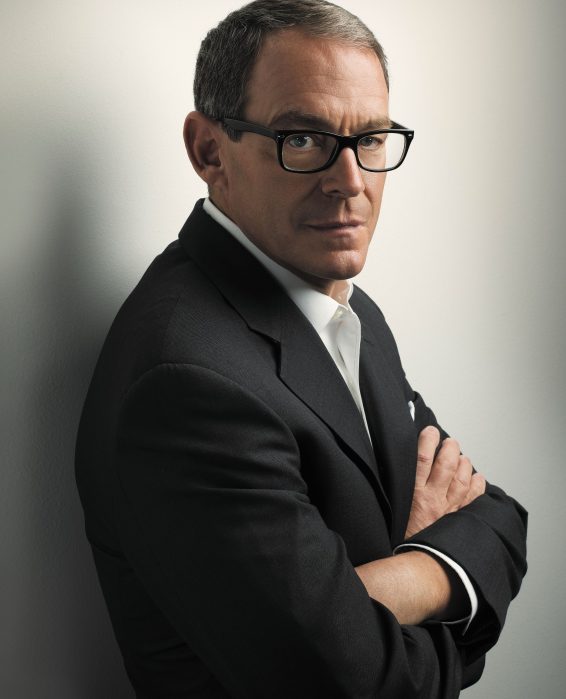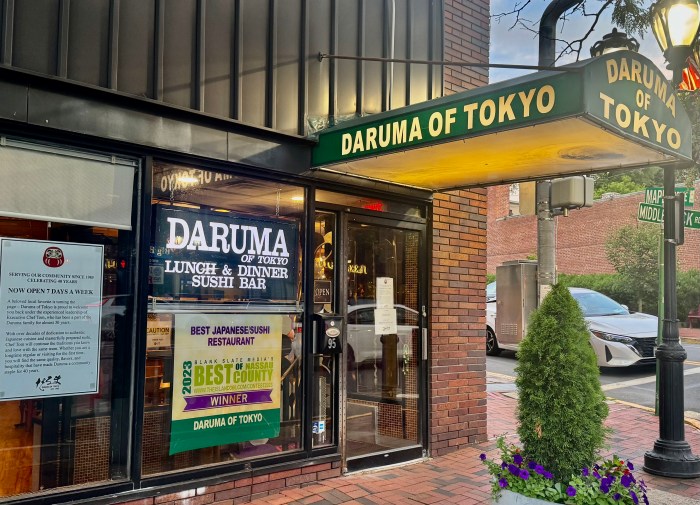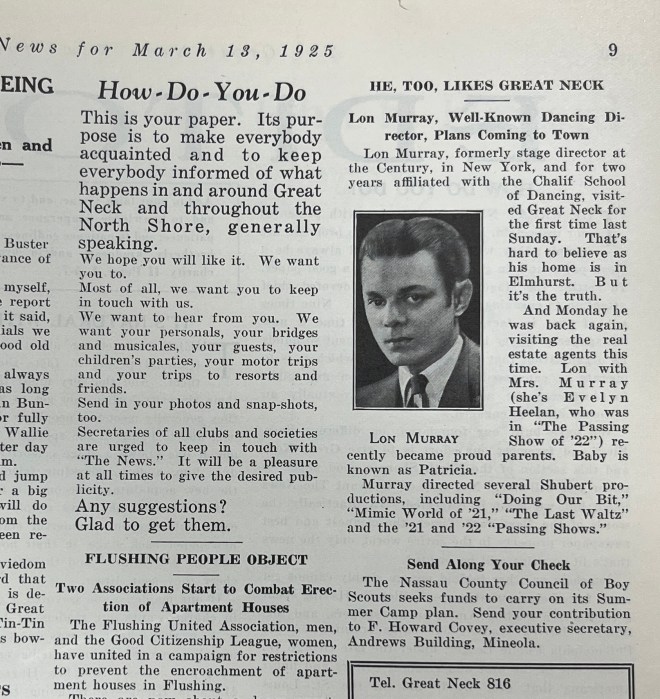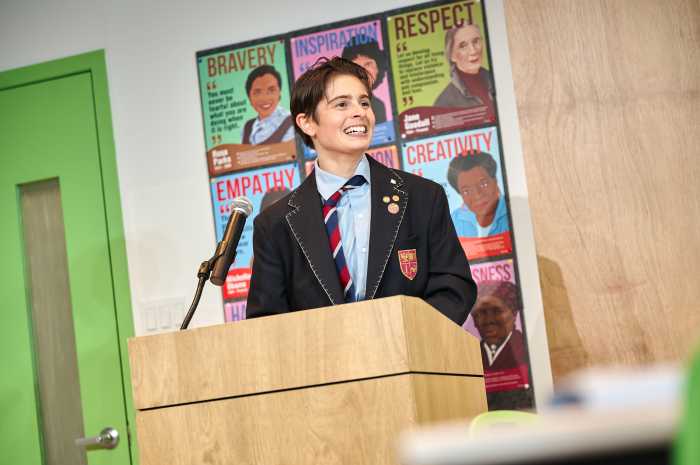
Village board hears earful from doubters. Part 1 of a two-part series
The Village of Great Neck Board of Trustees made the decision to switch to light-emitting diode (LED) streetlights this year. But for some residents, the issue clearly has not been settled.
The changeover from high-pressure sodium bulbs has yet to begin, but the same criticisms that marked the debate over introducing LEDs has not abated. At the Oct. 3 meeting, Mayor Pedram Bral and the board heard from a series of speakers who sought to link LED lighting to health problems.
First up during public comment was Patricia “Patti” Wood, founder and executive director of Grassroots Environmental Education, an organization concerned with, in her words, “the links between common environmental health exposures and adverse health effects.”
Wood said, “You’ve heard before in this room from well-informed and concerned citizens about the potential health effects of LED lighting.”
She then “connected the dots” between the lighting, sleep cycles and a recent disturbing study: “The suppression of the secretion of the hormone melatonin from artificial lighting at night has been shown to play a role in certain cancers.”
She added, “Myriad studies have shown that circadian rhythms are impacted by exposure to night lighting.”
Further, the American Medical Association (AMA) has concluded that the type of invisible “blue” light emitted by the LEDs chosen by the village “have five times the impact on circadian sleep rhythms than conventional street lamps.” An AMA study had suggested that LED street lamps “can possibly increase the risks of a number of serious health conditions, including cancer and cardiovascular disease.”
Wood pleaded for the village to avoid the fate of other communities, who “have forced their public officials to change out their high-energy blue light bulbs for the softer, safer alternatives, essentially requiring a municipality to pay double.”
She concluded, “We’re a community that’s already overwhelmed with environmental issues and we don’t want another one.”
Also weighing in was her husband, Doug, associate director of the group. He again emphasized the studies and told Bral, “As you know better than anyone in the room, science is developing and constantly finding new things.”
He added, “The company that wants to sell you light fixtures will tell you they’re safe—that’s their job. They’re not supposed to do medical research.”
Wood ended with a suggestion that the village switch to a lower-powered bulb “to significantly reduce the dangers to your residents.”
Bral, a physician, dismissed the studies, asserting that the indoor ones had been done with regular indoor lighting, and he had previously expressed doubt about the AMA study of outdoor LED lights.
“So to start talking about circadian rhythms, and to start talking about decreased melatonin secretions and to [cite] studies that really do not do anything except create fear is very disturbing,” he said, adding that he had discussed the issue with his colleagues and researchers and experts, “and no one takes this seriously.”
He went on to note that the village had been discussing changing to LED lights for two years and had heard from the public and multiple experts—and that the decision has been made.
“[If] something comes up that we have not heard as a board, then we have something new to discuss,” Bral said, cautioning against loose talk that only creates undue concern.
Doctor Vs. Doctor
Joshua Rosenthal, MD, board certified in ear, nose and throat (along with sleep medicine) challenged the mayor’s opinions on the effects of light on sleep disorders. He cited a recent multi-decade Harvard University study of thousands of nurses that finds a correlation between higher rates of breast cancer for those living in areas of high-intensity outdoor artificial light.
“The issue with street lights is that you can’t dim them,” Rosenthal said.
“We can dim them,” the mayor responded, without citing that the new fixtures will come with smart controls.
“The [Harvard] study focused on how light ‘bleeding’ indoors would affect [sleepers],” Rosenthal stated.
“Do you know what kind of lights we are putting in?” Bral asked Rosenthal. “You come here and speak without having the facts. As a physician, I’m upset with that.”
Rebecca Rosenblatt Gilliar, who ran against Bral in the recent election and has been a critic of the mayor, called out, “Do not lecture the public,” as both the mayor and Clerk/Treasurer Joe Gil told her to wait her turn to speak.
The mayor scolded his fellow physician for making accusations after not attending all the meetings and seeing how closely the board had looked at the issue. He found this insulting and concluded, “If you know the facts, discuss the facts. If you don’t know the facts, don’t create fear.”
Rosenthal responded, “I’m not creating fear. This is a scientific fact. Do you know how melatonin works? It works with the blue light spectrum. Do you know the frequency spectrum in nanometers of the lights you are installing? That would be a key feature of how much blue light is in the [bulb].”
Rosenthal further asked if the village had done studies of how much light would be hitting residents’ windows.
Trustee Barton Sobel replied that at residents’ request, the village can put shading behind the fixture to block the light.
“It’s an inexpensive, easy option that we discussed at a public hearing,” Sobel added.
Rosenthal was not quite satisfied with the answers, and his parting words were, “There are still unanswered questions about how much light is going to be affecting the residents.”
Mayor’s Critic Speaks
Rosenblatt Gilliar got up to speak, and after admitting that she did not have strong opinions of the installation of the LED lights, said that the mention of the Harvard study at a previous meeting had caused her to do more research.
“If there is an increase in breast cancer because of the [outdoor] lights, it would be the very first thing I would worry about for the rest of my community,” she said, noting the great number of young mothers she sees walking about.
“I’m so tired of hearing that you’re insulted,” she told the village leaders. “You don’t have the right to be insulted. You asked for this job, you have to be up there. People come and tell you what they think. You don’t lecture the public on what their opinions are.”
Addressing Bral, she added, “I find it appalling that you don’t care what the studies say. I don’t think it’s right for you to sit up there and say, ‘I’m a doctor. I know better.’ So, I say to you, give these people due respect when they come to our community. You don’t talk down to them and tell them they don’t have a right to their opinion. I’m embarrassed, as a member of the public, to see a meeting in my village conducted this way.”
The mayor, in response, tried to put the public’s faith in medical studies in perspective, saying some are great but not statistically significant, including in that subset some he had published himself.
“That [Harvard] study, according to many, is not statistically significant,” he said.
Board Gets Support
Leon Korobow, a resident, told the board, “You do have a responsibility to deal with the risks associated with inadequate lighting in the village. People fall, get hit [by cars]. Those things count, too. I haven’t always been happy with this board, but I am perfectly happy with the way this has been handled.”
He added, “If it works out the way it has been described, it will be a great thing for the village and a model for other villages.”
Korobow said that in the worst case scenario, which he doubted, if the light bulbs were proven to be a health hazard, then the village could simply change them.
“It’s not the end of the world,” he concluded.
The board also received support from resident Alan Steinberg, who stated that he was “proud that you’ve done your due diligence and you’re looking out for the [residents]. And if I knew that this would be on the agenda, there’d be hundreds of people behind me saying, ‘Thank you for what you’re doing.’ Also, you’re not addressing people from the community. It looks like expert witnesses were asked to come here tonight from outside the community and [comment] on a decision that was already made. So it was very kind of you to give them the microphone. Thank you for looking out for us.”
Actually, the LED lights issue was not on the evening’s agenda. But the public comment period allowed people who still had a strong opinion on the subject to speak their minds.
Look for Part 2 of this article in next week’s paper.




























